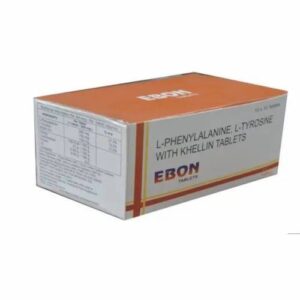L-PHENYLALANINE + L-TYROSINE + KHELLIN
L-Phenylalanine: L-Phenylalanine is an essential amino acid, meaning it cannot be synthesized by the body and must be obtained through the diet. It is found in various protein-rich foods, such as meat, fish, eggs, and dairy products.
L-Phenylalanine is sometimes used as a dietary supplement to treat certain conditions such as depression, attention deficit disorder (ADD), and chronic pain. It is also used to produce certain chemicals in the brain, including dopamine, norepinephrine, and epinephrine, which are important for transmitting signals between nerve cells.
The mechanism of action of L-Phenylalanine involves its conversion into L-Tyrosine, which is then converted into the neurotransmitters mentioned earlier. These neurotransmitters play a crucial role in regulating mood, attention, and other cognitive functions.
The recommended dose of L-Phenylalanine may vary depending on the specific condition being treated. Typically, a dosage between 500 to 1500 mg per day is considered safe and effective. However, it is important to consult with a healthcare professional to determine the appropriate dosage for individual needs.
While L-Phenylalanine is generally safe, there are potential side effects that may occur. Some common side effects include nausea, heartburn, and headaches. In rare cases, high doses of L-Phenylalanine can cause an increase in blood pressure. Individuals with a condition called phenylketonuria (PKU), a disorder that affects phenylalanine metabolism, should avoid L-Phenylalanine supplements as they may result in harmful levels of phenylalanine in the blood.
As with any supplement, it is essential to consult a healthcare professional before starting L-Phenylalanine, especially if taking other medications or having pre-existing medical conditions. They can provide personalized advice and monitor the effects of the supplement.
L-Tyrosine: L-Tyrosine is a naturally occurring amino acid that can be taken as a dietary supplement. It is used to enhance cognitive function, improve mental performance, and alleviate symptoms of stress and fatigue.
Mechanism of Action: L-Tyrosine is a precursor to several important neurotransmitters, including dopamine, norepinephrine, and adrenaline. These neurotransmitters play a crucial role in regulating mood, motivation, and attention. By increasing the availability of these neurotransmitters in the brain, L-Tyrosine supplements may help improve mental performance and reduce the effects of stress.
Dose: The recommended dosage of L-Tyrosine varies depending on the individual’s needs and the specific condition being treated. However, a typical dose ranges from 500 to 2000 mg per day, divided into two or three doses. It is best to start with a lower dose and gradually increase it to find the most effective dose for you.
Side Effects: L-Tyrosine is generally considered safe when taken at recommended dosages. However, some individuals may experience mild gastrointestinal upset, such as nausea, diarrhea, or stomach cramps. In rare cases, high doses of L-Tyrosine may cause potential side effects like increased heart rate, high blood pressure, or headaches. It is important to consult with a healthcare professional before starting L-Tyrosine supplementation, especially if you have any pre-existing medical conditions or are taking other medications.
It is also worth noting that L-Tyrosine may have potential interactions with certain medications, such as MAO inhibitors or Levodopa. Therefore, it is important to disclose all medications and supplements you are taking to your healthcare provider to ensure there are no potential adverse effects or interactions.
Overall, L-Tyrosine is a popular supplement used to support cognitive function, especially during periods of stress or fatigue. However, individual responses to L-Tyrosine may vary, and it is always advisable to consult with a healthcare professional before starting any new supplement regimen.
Khellin: Khellin is a medication primarily used in the treatment of asthma and bronchospasm. It is derived from the Khella plant, also known as Ammi visnaga, which is native to the Mediterranean region.
The mechanism of action of Khellin is not fully understood, but it is believed to work by relaxing the smooth muscles in the airways, thus increasing airflow and reducing bronchospasm. It may also have anti-inflammatory effects.
Khellin is usually taken orally and comes in tablet form. The typical dose for adults is 20-40 mg, taken two to four times a day. The dosage for children is typically lower and should be determined by a healthcare professional.
As with any medication, Khellin can cause side effects. Common side effects include digestive issues such as nausea, vomiting, and diarrhea. Some individuals may experience headaches or dizziness. Other potential side effects include skin rash, increased sensitivity to sunlight, and an increased heart rate.
It is important to note that Khellin is not commonly prescribed today, as other more effective and safer medications for asthma management are available. If you are considering using Khellin, it is essential to consult with a healthcare professional who can provide guidance and monitor your condition closely.

